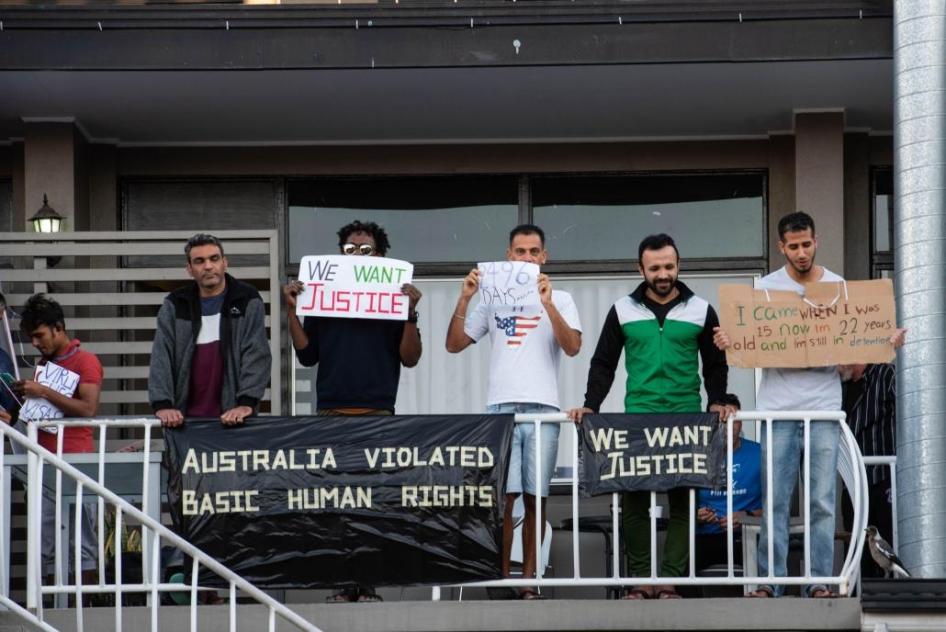Australia’s policy of transferring people seeking asylum to Pacific islands for processing is now a well-known, shameful domestic policy. Asylum seekers and refugees continue to suffer because of the Australian government’s unrelenting offshore processing regime and boat pushbacks. These measures are harmful enough, but their damage is compounded when other governments seek to replicate it. The UK government generated global outrage when it announced its plan in 2022 to send asylum seekers to Rwanda – an idea heavily influenced by Australia’s policies.
This month marked 75 years since the adoption of the Universal Declaration of Human Rights. Australia played a leading role in drafting the declaration and committed to protecting everyone’s rights, including to seek asylum.
But it has been more than a decade since the Labor government reintroduced offshore processing in 2012, transferring men, women, and children seeking asylum to Nauru; and men to Papua New Guinea (PNG). And leaders such as the former foreign minister and key architect of Australia’s offshore detention policy, Alexander Downer, and former Prime Minister Tony Abbott tout the ‘success’ of the so-called Australian model to governments like the UK. Downer has been appointed to the independent monitoring committee charged with overseeing the UK-Rwanda scheme, raising serious concerns.
The Australian government is exporting its unlawful, costly, and at times deadly, policies. The pursuit of deterrence at all costs has caused immeasurable suffering. And yet people fleeing persecution and other serious harm face a lack of safe and legal pathways to seek asylum in Australia, and so the boats continue to come.
Between May 2022 and May 2023, Australia intercepted and returned 221 people travelling by boat. In September and November, Australia transferred 23 people seeking asylum who had arrived by boat to Nauru – the first transfers in nine years and mere months after the last refugee was evacuated from Nauru. There is an enormous amount of secrecy surrounding the transfers, with the Australian Border Force insisting it ‘does not comment on operational matters.’
Asylum-seeker advocates have struggled to contact the 23 people sent to Nauru. Since June, support services for those held on the island have been overseen by the Nauruan government rather than the Australian authorities. The lack of transparency makes it difficult to know whether the people held there can get legal assistance, translators, medical and welfare services, and communicate with their family.
About 60 refugees and asylum seekers are still in Papua New Guinea 10 years after the Australian government sent them there. Now they are facing eviction from their accommodation as Australia and PNG are locked in a spat over outstanding bills.
The Australian government’s treatment of asylum seekers tarnishes Australia’s global reputation and should have served as a warning to other governments instead of an inspiration. The UK government is going to great lengths to evade a recent UK Supreme Court judgment declaring the UK-Rwanda scheme unlawful. The court ruled that the government should not send people seeking asylum to Rwanda because they risk being returned to their home country to face ill-treatment. In 2022, the UK government also passed a law that would allow the authorities to push back boats in the English Channel. The German and Austrian governments have stated they are considering the possibility of offshore asylum processing, while Italy and Albania recently signed an agreement under which people intercepted at sea by Italian vessels will be taken to Albania and detained there while their asylum claims are considered.
While the Australian government has recently taken some important steps to improve the situation for refugees, including abolishing temporary protection visas so that thousands of refugees living in Australia can apply for permanent residency and citizenship, it has been unwilling to abandon the core pillars of its cruel asylum policy.
Australia should take its obligations and responsibilities toward asylum seekers seriously, instead of foisting them onto other countries. The government should end offshore processing and pushbacks, which would send a clear message to other governments that this approach is not the way forward.
Asylum seekers and refugees on Nauru and PNG should immediately be transferred to Australia and people intercepted at sea should be granted access to fair asylum procedures on Australian territory, free from mandatory detention. And if Labor is truly committed to “combatting people smuggling and irregular migration,” its focus should be on further expanding resettlement and other migration pathways, and continuing to work globally to address the root causes of why people flee their homes.
The Australian and UK governments have shown little sign of adopting a more humane approach to migration. Yet in the face of these setbacks, the promise of the Universal Declaration of Human Rights, including the right to seek asylum, endures. No one should forget that the rights of asylum seekers and refugees in Australia and abroad are at stake.











